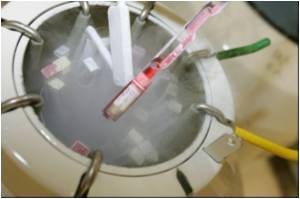Scientists have found that healthy eggs need a tremendous amount of zinc to reach maturity and be ready for fertilization.

"Currently we can't predict which eggs isolated from a woman produce the best embryos and will result in a baby. Not all eggs are capable of becoming healthy embryos," said Alison Kim.
The study conducted in mice revealed that the egg becomes ravenous for zinc and acquires a 50 percent increase in the metal in order to reach full maturity before becoming fertilized.
"Zinc helps the egg exit from a holding pattern to its final critical stage of development," said Tom O'Halloran.
Zinc levels were significantly higher in eggs than other important metals such as iron and copper. It was the only metal to change significantly in concentration during the maturation process.
The team also found that an insufficient accumulation of zinc caused all the eggs to pause prematurely before fertilizing.
The research will be published in the September issue of the journal Nature Chemical Biology.
 MEDINDIA
MEDINDIA




 Email
Email








